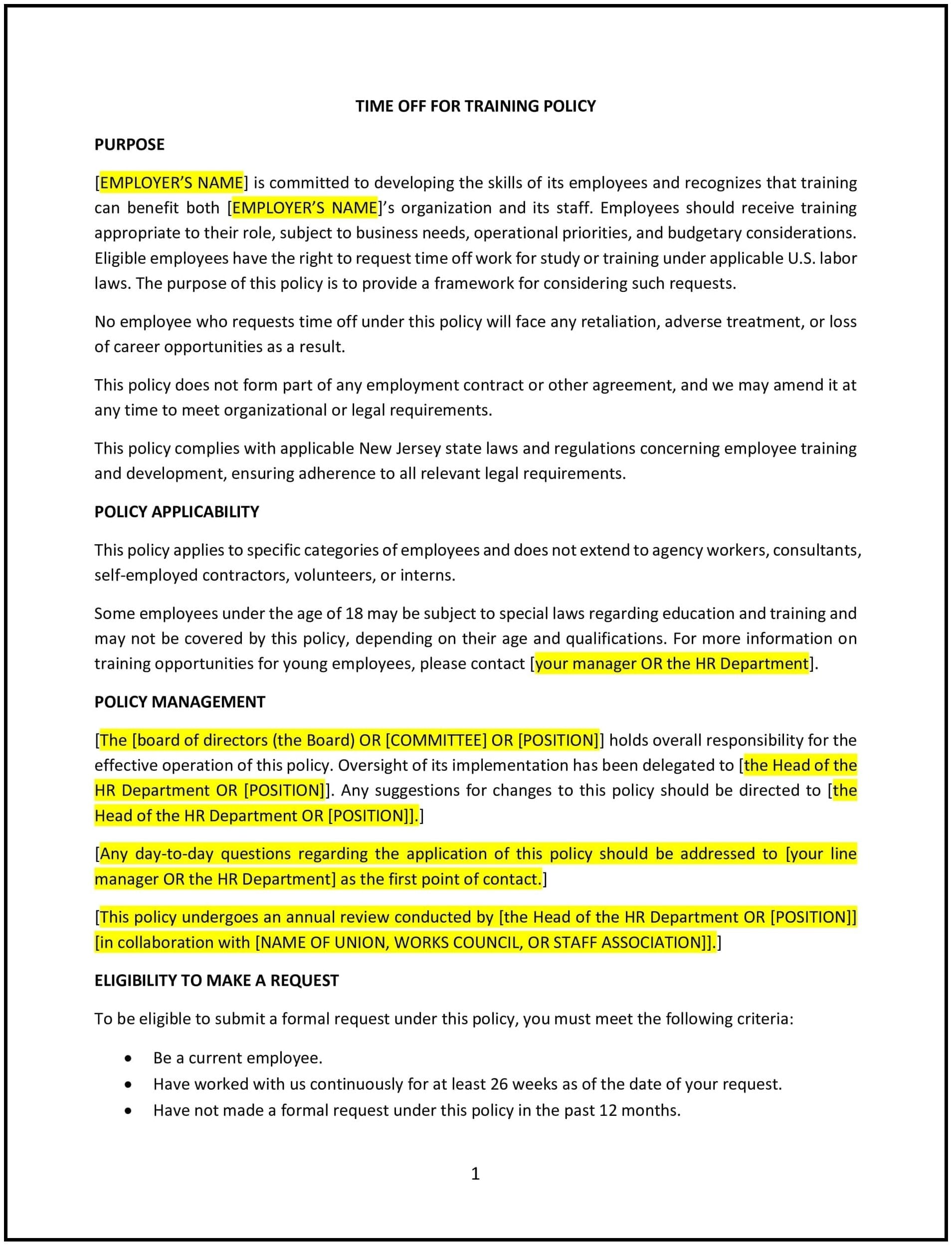Time off for training policy (New Jersey): Free template
Got contracts to review? While you're here for policies, let Cobrief make contract review effortless—start your free review now.

Customize this template for free
Time off for training policy (New Jersey)
A time off for training policy helps New Jersey businesses provide employees with the opportunity to enhance their skills and knowledge while ensuring that business operations continue smoothly. This policy outlines the procedures for requesting time off for training, the types of training that qualify, and any compensation or reimbursement available for employees attending training programs.
By adopting this policy, businesses in New Jersey can support employee development, increase productivity, and stay competitive in the market.
How to use this time off for training policy (New Jersey)
- Define eligible training: Specify what types of training are eligible for time off, such as job-related courses, certifications, or professional development programs.
- Set the process for requesting time off: Establish a clear procedure for employees to request time off for training, including advance notice and required documentation (e.g., course details or enrollment confirmation).
- Address compensation during time off: Clarify whether the time off for training will be paid or unpaid, and outline any reimbursement for training-related expenses, such as course fees or travel costs.
- Set guidelines for training duration: Define how much time off employees can take for training, whether it is limited to specific hours or full-day events, and any limits on frequency.
- Determine business impact: Encourage employees to consider how their absence for training may impact their workload and ensure that necessary arrangements are made for coverage.
- Support employee development: Provide guidelines for how employees can apply the skills and knowledge gained from training in their roles, encouraging professional growth and development.
- Review and update: Regularly assess the policy to ensure it reflects business needs, New Jersey regulations, and the company’s commitment to employee development.
Benefits of using this time off for training policy (New Jersey)
This policy provides several benefits for New Jersey businesses:
- Enhances employee skills: Offers employees the opportunity to acquire new skills, improving job performance and overall productivity.
- Increases employee engagement: Shows employees that the company values their professional development, leading to higher job satisfaction and retention.
- Keeps the company competitive: Ensures that employees are up-to-date with industry trends, tools, and best practices, keeping the business competitive in the marketplace.
- Promotes a learning culture: Fosters an environment of continuous improvement, helping the organization stay innovative and adaptive.
- Reduces skills gaps: Helps address skill gaps within the workforce by providing employees with the training they need to perform their roles effectively.
Tips for using this time off for training policy (New Jersey)
- Communicate the policy clearly: Ensure that all employees understand their rights to request time off for training and the process to do so.
- Plan for coverage: Ensure that adequate staffing is in place when employees are absent for training, and encourage employees to plan training at times that minimize disruption to business operations.
- Offer a variety of training opportunities: Provide employees with access to a range of training programs that align with their roles and career development goals.
- Track training attendance: Keep records of training programs attended by employees, including the type of training, dates, and any related costs, to ensure transparency and accountability.
- Review the policy regularly: Update the policy as needed to reflect changes in New Jersey regulations, the evolving needs of the business, or changes in training programs.